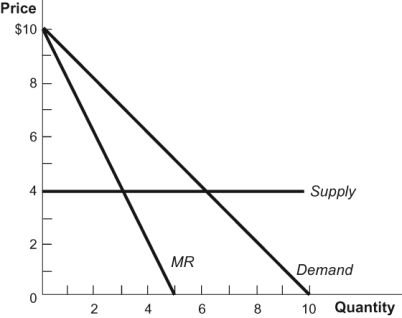Exam 15: Oligopoly and Game Theory
Exam 1: The Big Ideas253 Questions
Exam 2: The Power of Trade and Comparative262 Questions
Exam 3: Supply and Demand255 Questions
Exam 4: Equilibrium268 Questions
Exam 5: Elasticity and Its Applications282 Questions
Exam 6: Taxes and Subsidies226 Questions
Exam 7: The Price System277 Questions
Exam 8: Price Ceilings and Floors329 Questions
Exam 9: International Trade195 Questions
Exam 10: Externalities- When the Price Is Not Right278 Questions
Exam 11: Costs and Profit Maximization Under Competition237 Questions
Exam 12: Competition and the Invisible Hand153 Questions
Exam 13: Monopoly233 Questions
Exam 14: Price Discrimination277 Questions
Exam 15: Oligopoly and Game Theory241 Questions
Exam 16: Competing for Monopoly160 Questions
Exam 17: Monopolistic Competition and Advertising113 Questions
Exam 18: Labor Markets273 Questions
Exam 19: Public Goods and the Tragedy of the Commons249 Questions
Exam 20: Political Economy and Public Choice306 Questions
Exam 21: Economics, Ethics, and Public Policy257 Questions
Exam 22: Managing Incentives263 Questions
Exam 23: Stock Markets and Personal Finance275 Questions
Exam 24: Price Discrimination151 Questions
Exam 25: Consumer Choice146 Questions
Select questions type
Use the following to answer questions: Figure: Demand 1  -(Figure: Demand 1) A cartel facing the market in this diagram would try to cause industry output to:
-(Figure: Demand 1) A cartel facing the market in this diagram would try to cause industry output to:
(Multiple Choice)
4.9/5  (32)
(32)
Cartels in the United States were outlawed with the passage of the:
(Multiple Choice)
4.8/5  (38)
(38)
A cartel is a group of suppliers who try to create greater competition among their industry.
(True/False)
5.0/5  (32)
(32)
If your economics class was graded on a curve and everyone agrees to study only half as much, everyone would get the same grade that they otherwise would earn. You, however, will earn an A if you study more than the others, a C if you study the same amount as others, and an F if everyone else studies more than you. You don't like studying, but you'd rather study and get an A than get a C without studying, or study and get a C than get an F without studying. All the students in your class get together and agree not to study but have no way of verifying if anyone does study. What is it in your best interest to do?
(Multiple Choice)
4.8/5  (37)
(37)
How can the pursuit of market power lead to the social good?
(Multiple Choice)
4.8/5  (42)
(42)
Consumers "win" when a firm offers to match any competitor's price plus 10%.
(True/False)
4.9/5  (39)
(39)
When cheating is less profitable or easier to detect, a cartel will be easier to sustain.
(True/False)
4.8/5  (35)
(35)
The prisoner's dilemma is the negative counterpart to the invisible hand.
(True/False)
4.8/5  (34)
(34)
Use the following to answer questions: Table: Mary, Silvia Payoff Table Silvia Cooperate Cheat Mary Cooperate 20,20 10,40 Cheat 40,10 15,15
-(Table: Mary, Silvia Payoff Table) Refer to the table. Mary and Silvia are producers. If Mary cheats, what is Silvia's dominant strategy?
(Multiple Choice)
4.7/5  (41)
(41)
Use the following to answer questions: Table: Market for Oil
Suppose that oil is produced by 10 countries, each of which produces 10 million barrels of oil a day (MBD) for a total 100 MBD. The world price of oil at this quantity is $36 per barrel so each country earns $360 million a day. World Price (per barrel) World Quantity (MBD) \ 36 100 37.50 98 47.50 82 50 80
-(Table: Market for Oil) Refer to the table. Suppose that these countries form a cartel and each country produces 8 MBD. If one of the cartel members cheats by secretly pushing its production back to 10 MBD rather than 8, total revenue for the cheating country would:
(Multiple Choice)
4.7/5  (30)
(30)
Use the following to answer questions: Table: Payoff Matrix
The following shows a payoff matrix with two players and two strategies. The payoffs are listed in the order of Player 1's payoffs, Player 2's payoffs. Player 2 Cheat Cooperate (400,2,000) Player 1 Cooperate (1,000,1,000) (500,500) Cheat (2,000,400)
-(Table: Payoff Matrix) Refer to the table. What is Player 2's strategy in this game?
(Multiple Choice)
4.7/5  (35)
(35)
An oligopoly is a market that is dominated by a small number of large firms.
(True/False)
4.9/5  (34)
(34)
Which of the following statements regarding cartels is FALSE?
(Multiple Choice)
4.8/5  (35)
(35)
A dominant strategy is a strategy that a player should take only if the other player cheats.
(True/False)
4.9/5  (36)
(36)
Showing 61 - 80 of 241
Filters
- Essay(0)
- Multiple Choice(0)
- Short Answer(0)
- True False(0)
- Matching(0)